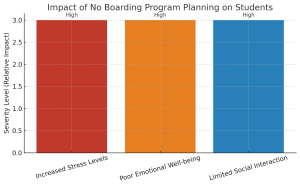For the sake of education, one aspect which stands out is the quality and the availability of the boarding program. For students who require a structured, supportive and engaging environment, a boarding program might be the key to their academic and social success. But given the lack of programs or careful No Boarding Program Planning these challenges can have an impact on the students and the schools.

What is No Boarding Program Planning?
No Boarding Program Planning is where programs aimed at supporting students living in university accommodation break down. These programs are often not a priority for universities and other accommodation providers to support even though they have an important impact on student success.
In cases where there is no formal program, students may lack a peer group, not learn daily living skills, and lack experience managing academics and living away from home. Institutions that do not have such a program may attract students who are more dissatisfied, less likely to graduate, and less well regarded.
The Importance of Boarding Programs for Student Success
Boarding programs are a central component for many, especially for students from remote communities and international students. A carefully designed program ensures students have adequate support, guidance, and social connections to succeed.

- Increased stress levels, poor emotional well-being, and limited social interaction all show high severity.
- Each factor equally contributes to the challenges faced by students.
- The absence of structure affects both academic and personal development.
Social Integration and Peer Support
Social integration is an important aspect of any boarding program. A boarding program allows the student to become closer with others, form friendships and build a sense of belonging. If not planned for, this can cause students to feel alienated and may affect their welfare and educational progress.
Academic Support
All boarding schools have resources that help students with academics, time management, and handling academic stress. The absence of academic support resources in a No Boarding Program scenario may lead to students falling behind in their academic progress, experiencing stress and being overwhelmed.
Structure and Discipline
Another aspect of many boarding schools is the structured life. A school day on a boarding Sport school schedule includes time for schoolwork, eating, sports and/or recreation, and sleeping. Students without this structure will never learn the self-discipline required to succeed in managing their time and setting priorities.
The Impact of No Boarding Program Planning on Students
Failure with implementation of effective guidelines in the boarding program can be harmful to students in many ways.
Students who do not live inside these organized structures could have difficulty balancing time among studying, socializing, and self-care in addition to finding adequate housing which can cause more stress.
Emotional Well-being is Poor in quality
Other aspects of adjusting to life away from home include lacking people for support, mentorship, or guidance, people with experience in the environment away from home which can lead to homesickness, loneliness, or isolation.
- College marks the first time most students will live away from home and potentially live alone.
- If familiar support systems, mentoring, and guidance are absent, people may feel loneliness or isolation.
- Students build relationships and develop social skills within a boarding program environment.
- These programs can promote positive relationships and a sense of community among students.
- Disorganized boarding programs may make it hard for students to become fully involved in and connected with other students.
The boarding program gives students opportunities through peer interactions, building good social skills, and developing positive relationships with others. Students in a boarding setting may have trouble meeting and connecting with fellow students if a suitable boarding program is absent.
Consequences for Institutions with No Boarding Program Planning
If the school does not have an orderly, well planned boarding program, not only will the students be affected directly, the school’s reputation will suffer and it may have difficulty in recruiting or retaining students.
| Consequence | Description | Impact |
| Lack of Program Planning | Without a structured boarding plan, schools struggle to manage student life effectively. | Leads to disorganization, confusion, and reduced student satisfaction. |
| Increased Dropout Rates | Students without mentorship or emotional support often feel isolated or unprepared. | Causes higher dropout rates and lower academic performance. |
| Reputation Damage | Poor housing and limited student services result in dissatisfaction among students and parents. | Generates negative publicity and lowers institutional credibility. |
| Recruitment Challenges | A damaged reputation makes attracting and retaining students more difficult. | Leads to reduced enrollment and financial instability. |
Increased Dropout Rates
Students who do not receive support at home or do not get guidance, social support, and mentorship on campus are more likely to drop out. Students may drop out when students feel unequipped to succeed at the school. This in turn may lead to lower retention and could damage the institution’s reputation.
Damage to the Institution’s Reputation
Dissatisfaction of students and parents because of lack of housing and support services most often results in negative reviews and thus negative perceptions of the school. Word of mouth, social media, and review sites such as Yelp or Trip Advisor are very important to a school’s public perception, and if a school’s boarding program is poorly planned.
Recruitment Challenges In Student Bodies
However, without a carefully planned boarding program, the school will not be able to compete for students who require that mode of education, and the families of such students will send their children to better planned schools.
How to Plan a Successful Boarding Program
To avoid the No Boarding Program Planning issues, the institution should plan a program for their boarding, with structure, support and challenges using the following considerations.
Well-being of students is a priority.
Institutions should give students mental health support access, staff to talk about wellbeing issues, and a way to report issues not effectively handled. This goal can advance with regular check-ins, mentoring, accessible counselors, and recognizing and responding to signs of distress.
Create a Balanced Daily Schedule for yourself
Successful boarding schools offer a structured day of academic study, extra-curricular activity, meals and free time. A school day which is organized in this way gives students a sense of achievement and a focus on their education and personal development while at boarding school.
Promote Social and Peer Connections
Socialization, group projects or even team-building activities throughout the school day can encourage peer engagement and help ease the development of friendships and peer relationships in boarding programs.
Effective Boarding Program Planning Conclusion
Overall, No Boarding Program Planning Wospac can cause a number of issues for pupils and administrators. These issues include increased stress levels and a lack of social structures for use to help pupils perform better academically or in other ways. This may cause a low retention rate, a damaged reputation, and difficulty to recruit new students.
While schools establish a boarding program that poses difficulties, schools can implement a successful program with focus on student safety and care, create an environment that grows students academically and personally and offer the best chance for positive outcomes.





